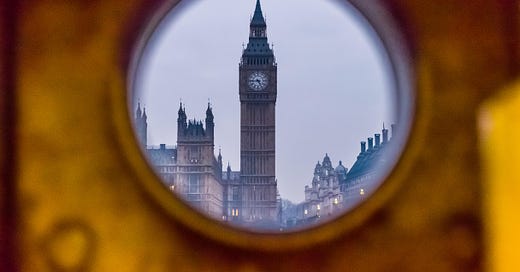Health committee raises the temperature on gambling suicides.
New Jersey appeals Kalshi injunction.
DOI pushes back on bid to block casino decision.
Alberta bill approved, now seeks Royal Assent.
Your biggest tech problems. Solved.
Fincore delivers technical solutions for the Gaming industry. For over 25 years we’ve helped clients modernise legacy platforms, unblock roadmaps, integrate complex systems, and apply AI to real-world problems. We’ll help you shape the right strategy, and then we’ll roll up our sleeves and deliver it.
Our edge? A world class team with deep domain knowledge, armed with our highly customisable IP toolkit that adapts to your architecture, whether modernising legacy or starting from scratch. That means faster delivery, smoother integration and less risk.
Déjà rue
Unsettling: MPs have called on the Labour government to conduct yet another review of the UK Gambling Act, just two years after the industry apparently reached a settled state for the first time in over a decade when the White Paper was published in April 2023.
Re-litigate: At the time, then Conservative culture minister Lucy Frazer said the White Paper provided for gambling regulation that “meets the challenges and seizes the opportunities” since the 2005 Act was passed.
Now, however, the UK parliament’s Health and Social Care Committee chair Layla Moran MP said she wants to open up the Act once more for further scrutiny.
The government should “review the Gambling Act to ensure that the current legislative framework gives all agencies the power and responsibilities needed to deliver a total system response,” she said.
Wide margin for error: Moran’s call came in a letter to Ashley Dalton, the under-secretary of state for Public Health and Prevention, which claimed that gambling lay behind between 117 and 496 “gambling-related suicides.”
The very data that lies behind Moran’s claims is, however, much disputed. It comes from an Office for Health Improvement and Disparities (OHID) report from 2023, which has been the subject of claim and counterclaim since it was published.
The new push from the health committee comes after a contentious public hearing, which GambleAware’s CEO Zoe Osmond characterized as being “inaccurate, unsubstantiated” and “ill-informed.”
Notably, Moran added that some committee members met with the anti-gambling lobby group Gambling with Lives.
Rinse and repeat: Moran’s letter took aim at gambling advertising, suggesting the OHID works with DCMS and the Advertising Standards Authority to “review the current regulation of gambling advertising.”
Seemingly oblivious to what is already in place, Moran called for the limiting of gambling advertising before the watershed and the strengthening of the rules on content to ensure the ads don’t appeal to children.
She also called for the “strengthening” of rules around sports sponsorship – but without specifying exactly what rules need strengthening – and the limiting of promos that encourage people to gamble.
Public information film: Apparently believing that advertising the harmful effects of gambling will be the answer, Moran suggested the OHID should “develop and launch a public information campaign” that would “cover all the possible harms associated with gambling, including gambling-related suicides.”
Somewhat controversially – and perhaps contradicting the claims about the number of gambling-related suicides – the Moran letter then suggested that “at present most gambling deaths are not properly investigated.”
“This is partly due to a lack of awareness among coroners of the link between gambling and suicide, as well as the fact that problem gambling is rarely recorded in an individual’s notes, unlike smoking, alcohol or drug use.”
Note: At no point did Moran question why this might be the case or what might be the issues behind this ‘apparent’ under-reporting.
Instead, she asked what steps the government will take to “raise awareness of gambling suicide among coroners.”
Rewire your RG Strategy
Founded on over a decade of groundbreaking research in neuroscience and neuroimaging, Mindway AI revolutionises safer gambling solutions. We combine innovative AI technology and deep insights into problem gambling from an expert panel to create secure, responsible gaming environments. Trust Mindway AI for a smarter, safer gambling experience.
Learn more at mindway.ai
+More
Attempts to legalize sports betting in Oklahoma are dead again. Two key bills failed to pass the Senate before the legislative deadline, prompting lawmakers to speculate that the issue may be revisited later this year following further study of its potential impacts.
The attempt in New Jersey to ban sweepstakes offerings took a step forward late last week when it advanced through a key committee stage in the state Assembly. The bill would outlaw platforms that use virtual currency and offer cash prizes, and establish new penalties for illegal gambling operations and practices. The next stage is a further committee on consumer affairs.
An FDJ United brand, Spooniker, which runs under the company’s Kindred umbrella in Sweden, has found itself in hot water with the country’s gambling regulator and been fined SEK10m ($1m) for having a lack of customer due diligence procedures. Spooniker had failed to identify the exact source of funds being processed through its systems, leading to potential exploits from bad actors.
Paraguay: A bill that would eliminate the existing gambling monopolies and establish a regulatory framework for the opening up of the country’s B&M and online gaming sector has been signed into law. It also grants the regulator Conajzar the right to approve new types of games and coordinate the process of approving licensing bids.
The NCAA is reported to be close to ending the ban on betting on professional sports for student athletes, coaches and staff, according to the Bleacher Report. During a recent meeting, the NCAA Division I Board of Directors approved removing the prohibition that blocks NCAA players, coaches and staff from betting on any sports the body sponsors at any level. However, the NCAA ban on college sports betting is expected to remain in place.
Great Canadian Entertainment has been fined $108,000 for allowing youngsters to gamble at three Toronto casinos. The Alcohol and Gaming Commission of Ontario reviewed four separate incidents where minors were spotted gambling on the floors at Great Canadian Casino Resort Toronto, Casino Ajax and Pickering Casino Resort.
The Michigan Gaming Control Board is keeping the US postal service busy after sending cease-and-desist letters to a further four online casinos, claiming they are operating illegally in the state. The sites include You Wager, Bet Pop Casino, Wager 7 and Discount Wager.
New Jersey appeal
Short circuit: The New Jersey Division of Gaming Enforcement (DGE) has appealed to the Third Circuit in efforts to stop Kalshi offering prediction markets on sports in the state.
The DGE had ordered Kalshi to leave the Garden State, arguing that it was exploiting a loophole and in breach of illegal gambling laws.
However, Kalshi sued, and a federal court granted the trading platform a preliminary injunction, meaning it could carry on.
Kalshi argues that federal law preempts state restrictions.
Not your job: New Jersey argues that the Commodity Futures Trading Commission (CFTC), a federal trading contracts regulator, was never intended to regulate sports betting and cited numerous federal laws as evidence of a longstanding policy disfavoring such activity.
Previously, the judge said Kalshi’s contracts fall within the CFTC’s exclusive jurisdiction and rejected the DGE’s claim that sporting events lack commercial significance.
Legal experts said the case could take a year or more unless expedited.
GuardDog, powered by Underdog, is a pioneering investment fund dedicated to fostering innovation in responsible gaming.
GuardDog supports and accelerates early-stage startups focused on building new and creative solutions to address problem gaming and further responsible gaming.
Ready to be one of the underdogs of responsible gaming?
Visit to apply: https://underdogfantasy.com/guarddog
DOI push back
Tension block: The US Department of the Interior (DOI) has asked a federal court to deny California’s Scotts Valley Band of Pomo Indians’ request for a temporary restraining order, after it pulled gambling eligibility on a planned $700m casino in Vallejo.
In a Friday filing in DC, the DOI said the tribe’s claims about at-risk contracts and investments were speculative and lacked detail.
“Scotts Valley provides no details on with whom it has contracted or how many contracts there are,” the department said, noting the land remains in trust and compact negotiations with the state continue.
The DOI also argued that its March 27 letter does not constitute a final agency action under the Administrative Procedure Act, meaning it carries no immediate legal consequences.
Even if it were reviewable, the agency said the tribe has no vested right to offer Class III gaming at the site, and thus no protected interest has been taken away.
It’s gonna cost ya: The tribe sued on April 1, claiming the rescission violated federal law and placed its substantial casino investments at risk.
It argued the DOI had previously given the project a green light in January before “unlawfully” reversing course.
The department said its decision was a lawful reconsideration still within agency discretion and consistent with precedent.
It added that it would maintain the tribe's land trust status while it reviews additional evidence as several tribes contest the casino project in federal court.
Alberta progress
Oh, we’re halfway there: The legalization of commercial OSB and iCasino in Alberta is almost there after the province’s legislative assembly passed Bill 48, or the iGaming Alberta Act, late last week after a third reading.
The bill passed without amendments and now moves towards Royal Assent before it is enacted.
The news was greeted warmly by the Canadian Gaming Association, which posted its congratulations on LinkedIn, saying it was a “significant milestone” and enhanced consumer protections within the province.
During the third reading, Dale Nally, Minister of Service Alberta and Red Tape Reduction, said the Act recognized more than half of all online gambling transactions that took place in the state were unregulated.
While the official Play Alberta monopoly had been a “success story,” the Act acknowledged it was ”sobering to consider that it’s only capturing up to 45 per cent of Albertans who gamble online.”
Straight outta Alberta: Further, the revenue being generated on these unregulated sites is “going straight out of Alberta and often out of the country.”
“This is revenue that could be reinvested into our province, where it could be used to benefit our Indigenous communities,” Nally added.
It is yet to be determined how many commercial operators will be licensed under the new framework or the applicable tax rates and licensing fees.
Nally noted the regulator would be Alberta Gaming, Liquor and Cannabis, which would ensure “appropriate regulatory oversight to make sure that regulated operators are acting responsibly and, perhaps more importantly, that all Albertans are better protected.”
Once Royal Assent is gained, Alberta will become the second Canadian province to regulate OSB and iCasino after Ontario.
Events
May 14: Player Protection Symposium, SBC Americas
Jun 5: Gaming in Holland, Amsterdam
Jun 9-12: IAGA, Berlin
Jun 26: Gaming in Spain, Madrid
Increase Operator Margins with EDGE Boost Today!
EDGE Boost is the first dedicated bank account for bettors.
Increase Cash Access: On/Offline with $250k/day debit limits
No Integration or Costs: Compatible today with all operators via VISA debit rails
Incremental Non-Gaming Revenue: Up to 1% operator rebate on transactions
Lower Costs: Increase debit throughput to reduce costs against ACH/Wallets
Eliminate Chargebacks and Disputes
Eliminate Debit Declines
Built-in Responsible Gaming tools
To learn more, contact Matthew Cullen, chief strategy officer on Matthew@edgemarkets.io
An +More Media publication.
For sponsorship inquiries email scott@andmore.media.










